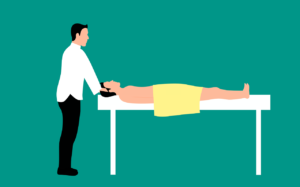
If you’ve ever experienced shoulder pain that seems to intensify as the night wears on, you’re not alone. This article explores the various causes of shoulder pain that gets worse at night, shedding light on potential reasons for your discomfort. Whether it’s an injury, inflammation, or underlying medical conditions, understanding these causes can help you find relief and improve the quality of your sleep. So, if you’re tired of tossing and turning due to a sore shoulder, keep reading to discover what might be behind your nighttime discomfort.
Causes of Shoulder Pain That Gets Worse at Night

Overview
Shoulder pain can be a frustrating and disruptive condition, especially when it gets worse at night. The discomfort can make it difficult to sleep or even find a comfortable position to rest in. Understanding the underlying causes of shoulder pain that worsens at night is crucial in order to seek appropriate treatment and find relief. In this article, we will explore various conditions that can contribute to this type of shoulder pain and discuss symptoms, diagnosis, and treatment options for each.
1. Rotator Cuff Injury
The rotator cuff is a group of four muscles and tendons that surround the shoulder joint and help facilitate movement. When these muscles and tendons are injured, it can lead to shoulder pain that intensifies at night.
1.1. Rotator Cuff Tendonitis
Rotator cuff tendonitis occurs when the tendons in the rotator cuff become inflamed or irritated. This can be caused by overuse, repetitive motions, or aging. The pain associated with this condition can worsen at night, especially when lying on the affected shoulder.
1.2. Rotator Cuff Tear
A rotator cuff tear is a more severe form of injury to the rotator cuff. This can occur due to a sudden injury or as a result of long-term wear and tear. When a tear is present, the shoulder pain can become more intense, particularly at night.
1.3. Symptoms
Common symptoms of a rotator cuff injury include shoulder pain that worsens at night, difficulty with overhead movements, weakness in the affected shoulder, and a clicking or popping sensation. It is important to note that the severity of symptoms may vary depending on the extent of the injury.
1.4. Treatment
Treatment for a rotator cuff injury may involve a combination of rest, physical therapy, pain medication, and in some cases, surgical intervention. Resting the affected shoulder, applying ice or heat, and avoiding activities that aggravate the pain can help alleviate symptoms. Physical therapy exercises are often recommended to improve strength and flexibility in the shoulder. In more severe cases, surgery may be necessary to repair the damaged tendons or muscles.

2. Shoulder Arthritis
Shoulder arthritis is another common cause of shoulder pain that gets worse at night. Arthritis refers to the inflammation of the joints, and when it affects the shoulder, it can cause significant discomfort and limited range of motion.
2.1. Osteoarthritis
Osteoarthritis is the most common form of arthritis and typically occurs with age or as a result of repetitive use or injury. When osteoarthritis affects the shoulder joint, it can lead to pain that worsens at night due to increased pressure on the joint during sleep.
2.2. Rheumatoid Arthritis
Rheumatoid arthritis is an autoimmune condition that causes inflammation in the joints, including the shoulder. The pain associated with rheumatoid arthritis can be particularly troublesome at night and may interfere with sleep.
2.3. Symptoms
Symptoms of shoulder arthritis may include pain, stiffness, swelling, and limited range of motion. The pain is often worse at night or in the early morning and may improve throughout the day with movement.
2.4. Treatment
Treatment options for shoulder arthritis include nonsteroidal anti-inflammatory drugs (NSAIDs) for pain relief, physical therapy to improve range of motion and strength, corticosteroid injections to reduce inflammation, and in severe cases, surgical interventions such as joint replacement surgery.
3. Frozen Shoulder
Frozen shoulder, also known as adhesive capsulitis, is a condition characterized by stiffness and pain in the shoulder joint. It typically develops gradually and can cause increased discomfort at night.
3.1. Causes
The exact cause of frozen shoulder is unknown, but it commonly occurs following a prolonged period of immobility, injury, or certain medical conditions such as diabetes or thyroid disorders.
3.2. Symptoms
The hallmark symptom of frozen shoulder is limited range of motion accompanied by pain and stiffness. The pain may be more pronounced at night, making it difficult to sleep comfortably.
3.3. Treatment
Treatment options for frozen shoulder aim to relieve pain and improve mobility. This may include physical therapy exercises, pain medication, corticosteroid injections, and in rare cases, surgical intervention.

4. Bursitis
Bursitis refers to the inflammation of the fluid-filled sacs known as bursae that cushion the joints. When bursitis affects the shoulder, it can lead to pain that worsens at night.
4.1. Causes
Bursitis in the shoulder can be caused by repetitive motions, overuse, trauma, or underlying conditions such as arthritis.
4.2. Symptoms
Common symptoms of shoulder bursitis include pain, swelling, tenderness, and limited range of motion. The pain may increase at night, making it difficult to find a comfortable sleeping position.
4.3. Treatment
Treatment for shoulder bursitis may involve resting the affected shoulder, applying ice or heat, taking pain medication, and undergoing physical therapy. In some cases, corticosteroid injections may be recommended to reduce inflammation and relieve pain.
5. Tendonitis
Tendonitis refers to the inflammation or irritation of tendons, which are the thick cords that connect muscles to bones. When the tendons in the shoulder become inflamed, it can result in nighttime shoulder pain.
5.1. Causes
Tendonitis in the shoulder can be caused by overuse, repetitive motions, or aging. Activities that involve repetitive overhead movements or heavy lifting can increase the risk of developing tendonitis.
5.2. Symptoms
Symptoms of shoulder tendonitis include pain, tenderness, swelling, and limited range of motion. The pain may worsen at night and can interfere with sleep.
5.3. Treatment
Treatment for shoulder tendonitis typically involves resting the affected shoulder, applying ice or heat, taking nonsteroidal anti-inflammatory drugs (NSAIDs), and undergoing physical therapy. In severe cases, corticosteroid injections may be recommended to reduce inflammation.
6. Impingement Syndrome
Impingement syndrome occurs when the tendons in the shoulder become compressed or irritated as they pass through a narrow space called the subacromial space. This can result in shoulder pain that worsens at night.
6.1. Causes
The most common cause of impingement syndrome is repetitive overhead movements or activities that strain the shoulder, such as throwing, swimming, or weightlifting. Structural abnormalities in the shoulder joint can also increase the risk of impingement.
6.2. Symptoms
Common symptoms of impingement syndrome include shoulder pain, weakness, limited range of motion, and swelling. The pain may be more noticeable at night, especially when lying on the affected shoulder.
6.3. Treatment
Treatment for impingement syndrome may involve rest, physical therapy exercises to strengthen the shoulder muscles and improve range of motion, pain medication, and in severe cases, surgical intervention to create more space in the subacromial space.
7. Shoulder Instability
Shoulder instability refers to the excessive movement of the shoulder joint, which can lead to pain, weakness, and a sensation of the shoulder “popping out” or feeling unstable.
7.1. Causes
Shoulder instability can be caused by damage to the ligaments, tendons, or muscles that support the shoulder joint. This can occur due to trauma, repetitive strain, or underlying conditions such as hypermobility.
7.2. Symptoms
Common symptoms of shoulder instability include shoulder pain, a feeling of the shoulder being loose or unstable, recurrent shoulder dislocations, and limited range of motion. The pain may worsen at night, particularly when lying on the affected shoulder.
7.3. Treatment
Treatment for shoulder instability may involve physical therapy exercises to strengthen the shoulder muscles, wearing a sling or brace for support and stabilization, and in severe cases, surgical intervention to repair or reconstruct damaged ligaments or tendons.
11. Heart Attack
While shoulder pain that worsens at night can often be attributed to musculoskeletal conditions, it’s important to be aware that it can also be a symptom of a heart attack. This is particularly true if the pain is accompanied by other warning signs such as chest pain, shortness of breath, dizziness, or nausea.
11.1. Symptoms
The symptoms of a heart attack can vary between individuals, but they often include chest discomfort or pain, shortness of breath, pain or discomfort in other areas of the upper body, such as the shoulders, arms, neck, jaw, or back, and other symptoms such as lightheadedness, cold sweats, or nausea.
11.2. Difference from Musculoskeletal Pain
Differentiating between musculoskeletal shoulder pain and heart attack-related pain can be challenging, as they may share similar characteristics. However, heart attack pain is typically more severe, persistent, and accompanied by additional symptoms. If you are experiencing severe or concerning symptoms, it is essential to seek immediate medical assistance.
11.3. Seeking Medical Assistance
If you are unsure about the cause of your shoulder pain or if you experience severe or concerning symptoms, it is crucial to seek medical assistance promptly. A healthcare professional can conduct a thorough evaluation, perform any necessary diagnostic tests, and provide appropriate treatment or referral to a specialist if needed.
In conclusion, shoulder pain that worsens at night can be caused by various conditions, including rotator cuff injuries, shoulder arthritis, frozen shoulder, bursitis, tendonitis, impingement syndrome, and shoulder instability. It is essential to understand the underlying cause of the pain in order to pursue appropriate treatment options and find relief. If you are unsure about the cause of your shoulder pain or experience severe symptoms, it is important to seek medical assistance for an accurate diagnosis and appropriate care. Remember, timely intervention can help alleviate your discomfort and protect your overall shoulder health.







